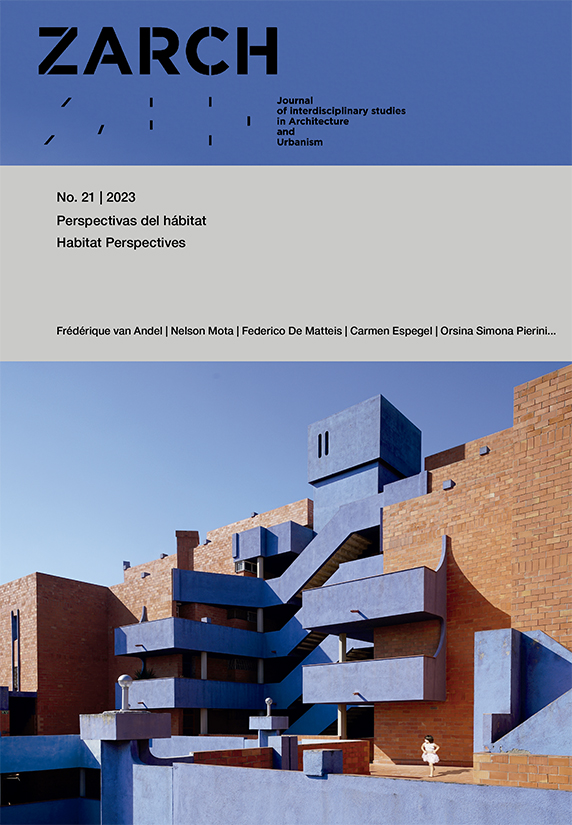‘Lost Space’ Found: Reconsidering Functional Ambiguity as a Strategy for Housing Design
DOI:
https://doi.org/10.26754/ojs_zarch/zarch.2023218931Keywords:
Portugal, Housing, Free Plan, Adaptable Design, Lost Space, Functional AmbiguityAbstract
The current response to housing issues, undoubtedly a pressing problem of our time, implies an acceptance of the diversity of ways of living and their transformation over time, in addition to factors such as demographic movements, the ageing of the Western population, and climate change, which call for a thorough review of housing types and their implementation. A review of this calibre cannot be conducted without the awareness that the problem, despite its current nature, has persisted over time, and given rise to an extensive body of knowledge. This paper aims to highlight the innovative design strategies geared towards a more open configuration of the dwelling and which are supported by theoretical research. The text opens by revisiting the free plan in its multiple configurations as the seed of adaptable design and advances to offer a more in-depth examination of the case of Portugal in the 1960s, a period in which the construction of affordable housing underwent considerable development. The notions of lost space, superfluous space, circulation and functional ambiguity emerge in this context of scarcity with great critical acuity. A short selection of contemporary case-studies, included in the last section of the paper, lead to a renewed reflection on the pertinence and relevance of these notions applied to current housing design.
Downloads
References
Arenga, Nuno, ed. Vítor Figueiredo: fragmentos de um discurso. Porto: Circo de Ideias, 2012.
Cabral de Mello, Duarte. Vítor Figueiredo: La misère du superflu. L’Architecture d’Aujourd’hui 185 (1976): 30.
Castela, Tiago. Cidadania Proprietária e Emergência da Financeirização da Habitação em Portugal Após 1968. In A Nova Questão da Habitação em Portugal, ed. Ana Santos, 259-274. Coimbra: Actual Editora, 2019.
Chombart de Lauwe, Paul-Henry, ed. Famille et Habitation, vol. 1 and 2. Paris: CNRS, 1959/1960.
Franchini, Alberto. Luigi Snozzi and Livio Vacchini Casa Patriziale in Carasso. In A Historical-Critical Guide to 20th-Century Architecture in Canton Ticino, ed. N. Navone. Balerna: Archivio del Moderno, 2021.
Hespel, Christophe. 40 logement sociaux, Dijon: Sophie Delhay. AMC 281 (October 2019) :10.
Lacaton, Anne; Vassal, Jean-Philippe. Lacaton & Vassal, free space, transformation, habiter. Madrid/Barcelona: Fundación ICO/Puente editores, 2021.
Lameira, Gisela; Ramos, Rui Jorge Garcia; Valentim, Nuno; Mohammadpanah, Azar. Good Architecture Matters: The Architect’s Perspective on Design for Ageing and Energy Efficiency, Buildings 13, 4 (2023): 1067-1104.
Lameira, Gisela; Rocha, Luciana; Ramos, Rui Jorge Garcia. Affordable Futures Past: Rethinking Contemporary Housing Production in Portugal While Revisiting Former Logics. Urban Planning 7, 1 (2022): 223-240.
Latour, Alessandra, ed. Louis I. Kahn: escritos. Madrid: El Croquis editorial, 2003.
Le Havre, World Heritage site. The Perret show flat. http://unesco.lehavre.fr/en/discover/the-perret-show-flat (consulted the 10 of October of 2023).
Lopes Dias, Tiago. Teoria e desenho da arquitectura em Portugal, 1956-1974: Nuno Portas e Pedro Vieira de Almeida. PhD thesis, Department of Theory and History of Architecture, Polytechnical University of Catalunya, 2017.
Lucan, Jacques. Le plan paralysé (du logement) contre le plan libre (de la maison): L'antinomie de l'architecture moderne. Matières 16 (September 2020): 103-111.
Maldonado, Vanda; Namorado Borges, Pedro, eds. Vítor Figueiredo. Projectos e obras de habitação social 1960-1979. Porto: Circo de Ideias, 2015.
Marchand, Bruno. Le noyau central comme vecteur de transition entre le plan libre et le plan flexible. Matières 11 (November 2014): 33-47.
Montaner, Josep Maria. The legacy of collective modern housing. ZARCH 5 (2015): 24-39.
Peris, Marta; Toral, José. 85 viviendas sociales en Cornellà, 2021, https://peristoral.com/proyectos/85-viviendas-sociales-en-cornella (consulted the 10 of October of 2023).
Portas, Nuno. Estudo das funções e da exigência de áreas de habitação. vol. 1, Lisboa: LNEC, 1964.
_____. A Habitação Social. Proposta para a metodologia da sua arquitectura. vol. 2, Porto: FAUP, 2004.
Raymond, Henri; Haumont, Nicole; Raymond, Marie-Geneviève; Haumont, Antoine. L'Habitat Pavillonnaire. Paris: Centre de Recherche d' Urbanisme et Institute de Sociologie Urbaine, 1966.
Van Rooyen, Xavier. Free Plan versus Free Rooms. Two Conceptions of Open Architecture. Footprint 16, 2 (2022): 85-104.
Van Velzen, Endry. Tussen Traditie En Vernieuwing, Een Ensemble in Le Havre. OverHolland 13, 21 (2021): 195.
Vieira de Almeida, Pedro. Ensaio sobre o espaço da arquitectura. Porto: CEAA, 2013.
_____. O espaço perdido e outros textos críticos. Porto: CEAA, 2018.
Downloads
Published
How to Cite
Issue
Section
Funding data
-
Fundação para a Ciência e a Tecnologia
Grant numbers UIDB/00145/2020


